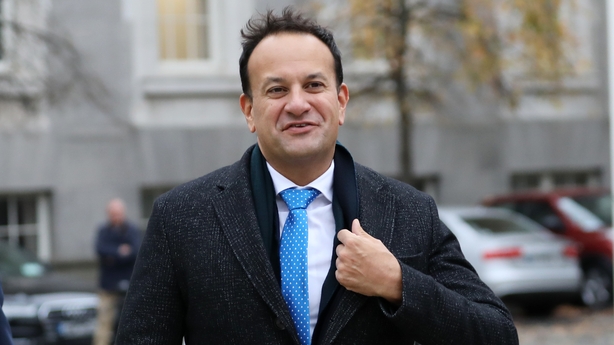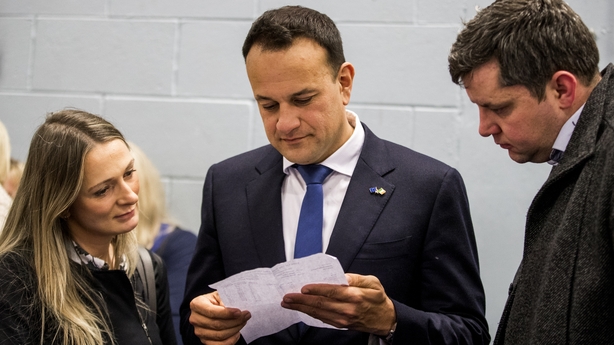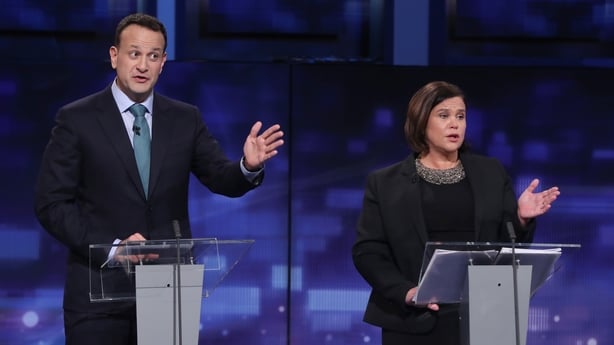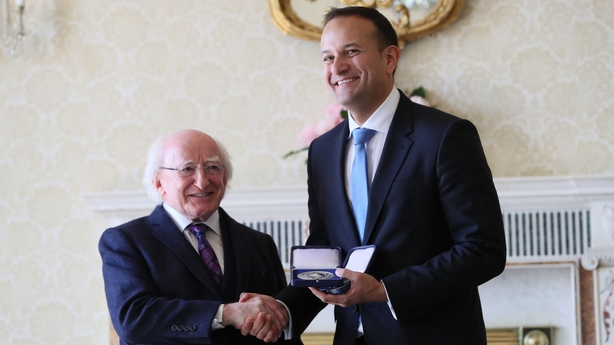In just five days, we will know a lot about how Leo Varadkar intends to lead his party, the Government, and the country, writes RTÉ's Political Correspondent Paul Cunningham.
Day One: Saturday
After Leo Varadkar receives his seal of office at Áras an Uachtaráin at lunchtime and has a chat with President Higgins and Ms Higgins, he will return to Government Buildings to commence his second term as Taoiseach.
The in-tray is heavily laden with immense problems: a housing crisis, cost-of-living crisis, energy crisis, climate crisis, the war in Ukraine, refugees and the running sore that is Brexit.
The first challenge, however, will be to call in the Ministers who attend Cabinet and inform them whether they're staying put, changing portfolio or getting the chop.

What will he do?
The expectation within Fine Gael is that the new Taoiseach will adopt a conservative approach and make limited changes.
As one senior member of his parliamentary party told me on Wednesday night: "Don't expect a surprise."
Mr Varadkar had told his TDs, Senators and MEPs earlier that evening that this was the best team that Fine Gael ever had, a statement interpreted as presaging a minimal Cabinet reshuffle.
However, some in his party believe it is partly down to the fact that Mr Varadkar is averse, politically-speaking, to being brutal.
They fret that he may not freshen up the front bench before the next General Election, leaving the party looking tired.
Later tonight, Mr Varadkar will chair his first Cabinet meeting as Taoiseach of this coalition Government.
His demeanour will be watched closely, given he was viewed by many in Fianna Fáil as being less than helpful in the early weeks of Micheál Martin's tenure.
That said, he warmly praised Micheál Martin at Fine Gael's 81st Ard-Fheis, which was held in Athlone: "Through difficult circumstances, including the latter stages of the pandemic and war in Ukraine, he has been a voice for decency, kindness and for common sense."
Mr Varadkar will, no doubt, also have noted Mr Martin's strong backing regarding a video of the Tánaiste socialising in a Dublin nightclub, saying it was a "breach of privacy" and "wrong".
Equally, a relationship of trust has been built-up with the Green Party leader, despite harsh words being exchanged during Mr Varadkar's first time as Taoiseach when Eamon Ryan was on the Opposition benches.
Will that cohesiveness and collegiality remain when a crisis hits or, by 2024, when the Local and European elections are on the horizon? Or could the trust fray as each Coalition party has to think of saving its own skin?
Day two: Sunday
The expectation is that the newly minted Taoiseach will do a round of media interviews to outline his priorities and plans for the coming years.
One insider said Mr Varadkar's knowledge of how government works, from his first term as Taoiseach, will greatly enhance his capacity to deliver in his second.
They said he is keenly aware that there is only so much he can achieve, and therefore prioritisation is key.
What might those priorities be?
Continuing to respond to the cost-of-living crisis is most certainly one and using media opportunities to link this year's multi-billion budget to new policies like halving the cost of childcare, reducing the price of using public transport and lowering college fees.

Housing is an obvious key priority, but watch out for Fine Gael making efforts to butter the parsnips of rural Ireland, for example, by ensuring broadband rollout is delivered.
The challenge for Mr Varadkar is to make a connection with a population some of whom are still roiled by the property crash, the Covid-19 pandemic and the cost-of-living crisis.
His party is looking at the ominous opinion polls which suggest that Sinn Féin is performing particularly well.
The Fine Gael TDs and Senators also know that, under Mr Varadkar, they saw a 4.7% drop in first preference votes in the 2020 General Election which contributed to a 15-seat loss when compared with 2016.
In 2019, Fine Gael lost four by-elections held on the same day in Dublin Mid-West, Cork North Central, Wexford, and Dublin Fingal.
In 2021, Fine Gael was defeated in the Dublin Bay South by-election by the now-Labour Party leader Ivana Bacik.
To turn that around and calm the Fine Gael nervous nellies, Leo Varadkar needs to be able to convince the electorate that they should vote for his party which has been in power for more than a decade.
The new Taoiseach does have strong debating skills, a command of detail and an eye for the soundbite.
He has modified the more acerbic side to his character, but his capacity to communicate to the widest possible audience is going to be crucial to the fortunes of Fine Gael, particularly when problems like the housing crisis are not going to be resolved any time soon. This will be his first test.
Day three: Monday
Monday evening is the time that the Coalition leaders meet in Government Buildings, along with one aide each, to sign off on the plans for Cabinet the following day.
Due to today's sitting, the leaders' meeting has actually be postponed until Tuesday, with Cabinet sitting on Wednesday.
To a certain extent, Mr Varadkar has boxed into the policies agreed under the programme for Government, as was Micheál Martin when Taoiseach.
Be that as it may, the buck stops with Mr Varadkar when it comes to delivery.
For example, this week's Cabinet is supposed to agree to the revised Climate Action Plan, a policy which is being led by Environment and Climate Minister Eamon Ryan.
The policy was supposed to have secured Ministerial sign-off last month in advance of the UN climate conference in Egypt. Then it was slated for early December.
Next Tuesday is the latest deadline for it to be agreed by Ministers.
Failure to get the policy document over the line does not just raise questions about the capabilities of the Green Party leader, it also raises doubts about the Taoiseach's capacities too.
It will also provide an opportunity for his detractors to remind the public about comments he made in 2019 when he opined that there were "pluses and minuses" to global warming.
Day four: Tuesday
This is the day when decisions are going to be made about Ministers of State, with details being made public on Wednesday.
To the public at large, news about junior ministers will probably be of scant interest.
Internally, however, this is a big deal: there will be winners and losers.
It presents a danger for Leo Varadkar as a demoted Minister of State, or a backbencher who has had their expectations of promotion dashed can become a malcontent, if not a mortal enemy.
After all, what have they got to lose?
Usually, on a Tuesday afternoon, Mr Varadkar will face Leaders Questions in the Dáil, but the Houses of the Oireachtas will adjourn for the Christmas break after Saturday's session.

On its return in January, Mr Varadkar will have to decide on how he's going to respond to the many pointed questions from the Sinn Féin leader, Mary Lou McDonald.
As Tánaiste, he often went toe-to-toe with Sinn Féin's finance spokesperson Pearse Doherty leading to bitter exchanges between the two.
But is that necessarily the approach he wants to adopt with Ms McDonald?
An insider told me Mr Varadkar will be targeting the policies and not the person.
So expect lots of barbs from him, such as the regular Fine Gael claim that Sinn Féin is a high-tax anti-jobs party which will wreck the economy.
Mr Varadkar also regularly castigates Sinn Féin as being the clearest manifestation in Ireland of populism.
He told his Ard-Fheis: "All the hallmarks are there - simple solutions to complex problems, elevating anger over facts... conspiracy theories."
But will Mr Varadkar be able to hold back, and rise above the fray, when Ms McDonald deploys her highly regarded debating skills and the temperature begins to rise?
In 2017, when Taoiseach Leo Varadkar went for her and likened the Sinn Féin leader to the far-right French leader Marine Le Pen: "She always goes back to her script."
Will he be able to resist going there again?
Day five: Wednesday
Given it's 21 December, and just a few days away from Christmas, an outsider might be of the impression that Leo Varadkar can put his feet up and take a moment.
Not this Wednesday, as he'll have his second Cabinet meeting.
The deeper truth is that, as Taoiseach, Mr Varadkar will always be on duty and needs to be prepared to respond to an unexpected crisis at a moment's notice.
He is a lot of political experience to draw on, even though he is only going to be 44 next month.
A Councillor, a TD, a Minister for Transport Tourism and Sport, Minister for Health, Minister for Social Protection and then Ireland's youngest-ever Taoiseach.
That said, critics argue Leo Varadkar is prone to making gaffes.

His supporters will point to successes such as delivering a deal on Brexit with Boris Johnson, his calmness in the face of the Covid-19 pandemic and the fact that more people are employed in Ireland than ever before.
Yet they also know, to their own frustration, that the Fine Gael leader can mess up: the most glaring being the leaking of a draft pay agreement for general practitioners which triggered a garda investigation.
So maybe Mr Varadkar will have the opportunity on this day to reflect on how he wants to present himself to the public and what the public wants from him, probably fewer sock references and discontinuing the Love Actually and Mean Girls quotes.
Gone are the days of being the shiny new thing, who was listed by Time magazine as one of the 100 most influential people in the world.
It is the second time around as Taoiseach and so things have to be different.
For example, one of the first challenges will be ensuring that the delayed Mandatory Disclosure Bill, which provides for full candour of completed individual patient-requested reviews of their HSE cancer screening, is passed by the Oireachtas.
Labour TD Alan Kelly said, pointedly, that what's currently being proposed by the Government fails the "Vicky Phelan test."
Promises have been made by the Government and the Taoiseach is the person with the ultimate responsibility of getting them over the line.
As Frank Underwood, the fictitious president in the hit TV series House of Cards, once said: "The nature of promises is that they remain immune to changing circumstances."

